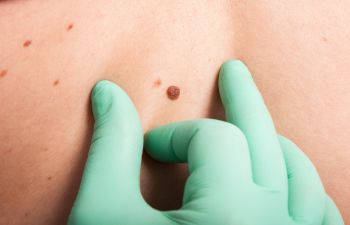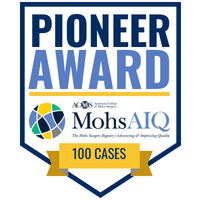
Skin cancer is a very prominent problem in the world today. Many people think that the skin is just one body organ that does not need the same attention that they give to other body systems. However, this is very untrue, with all of the media attention and popularity of having “young,” “glowing,” “tanned” skin, it is even more important to understand how to take care of your skin and prevent skin cancer. There are three forms of skin cancer: basal cell carcinoma, squamous cell carcinoma, and melanoma. Most skin cancers can be linked to sun exposure, however genetics also plays a significant role. While we can not control our genetics, we can control our behavior and protect our skin from the sun. Although most skin cancers are seen in the elderly, Dr. Kayal has diagnosed melanoma in children and basal cell carcinoma in men and women in the late 20’s. Everyone should have a yearly skin exam by a dermatologist and it is important that you learn to check your moles for changes. Checking your skin is as easy as learning your ABCDE’s!
Basal Cell Carcinoma
Basal cell carcinoma (BCC) is the most common form of skin cancer. BCC can show up anywhere on the body and is most commonly found on the face, especially the nose. BCC is most often described as a “pimple that will not heal.” It is usually small (less than half a centimeter), is “pearly” in color and may bleed. Treatment is based on the size, location, and type of BCC. Dr. Kayal is a fellowship trained MOHS surgeon with expertise in treating skin cancer in difficult areas such as the eyelid, lip, nose, ears, hands, and feet.
Squamous Cell Carcinoma
Squamous cell carcinoma (SCC) is the second most common skin cancer. SCC can also appear anywhere on the skin however it is most commonly found on the face and back of the hands. SCC is described as a red scaly plaque that does not go away. It usually scabs over with dry skin and although the dry skin will peel off it always comes back. Treatment of this type of skin cancer also depends on the size and area of the body. Early diagnoses and treatment of SCC is vital to a good prognosis, due to the fact the SCC has a higher tendency to metastasize to other body organs without treatment.
Melanoma
Although melanoma is the least common skin cancer it is the most dangerous. Melanoma can be genetic or can be caused by sun damage. Your prognosis and treatment depends on the thickness of the disease as determined on a biopsy which Dr. Kayal sends to a board certified dermatopathologist. The most important aspect of early detection of melanomai s yearly skin exams by your Dermatologist and by monitoring changesi n your own skin. Monthly skin exams can be performed at home by following the ABCD’s.
- Stands for asymmetry; asymmetry is when a mole has a different appearance on one side compared to the other
- Is for borders, checking the borders of moles are important. Most moles are round in nature, however when the borders of the mole become jagged or irregular, it raises suspicion.
- Is for color; the color a mole is the most controversial of all of the aspects of checking moles. The key to checking the color of a mole is to look for any change from lighter to darker in color. Another important aspect is a mole that has different coloring within the mole itself. All of these changes are a call for alarm.
- Stands for diameter. This is reference to the size of the mole. The larger the mole, the more suspicious it becomes. Anything over 6mm, the size of a pencil eraser, is a cause for concern. Anytime a mole increase in size should alert you to see a physician.
- Stands for evolution, if the lesion becomes raised and or changes as it evolves over time, it should be examined.
Now you know your ABCDE’s and are more aware of the changes your skin can go through. Dr. Kayal recommends that you watch your skin for any new mole, any changing mole, and any skin lesion that just will not heal. To protect yourself from all of these types of skin cancer a sunscreen of at least 30 SPF should be worn at all times on all areas of the body that are exposed to the sun. This includes every day exposure. Anyone with a family history of skin cancer, particularly malignant melanoma, should be checked more regularly by a Dermatologist for any skin changes. To schedule your skin care evaluation please call our office at 770-426-7177.
Posted on behalf of
141 Lacy Street, Suite 200
Marietta, GA 30060
Phone: (770) 426-7177
FAX: (770) 426-7745
Email: kayaldermatology@gmail.com
Mon-Fri: 7:30 am – 5:00 pm







